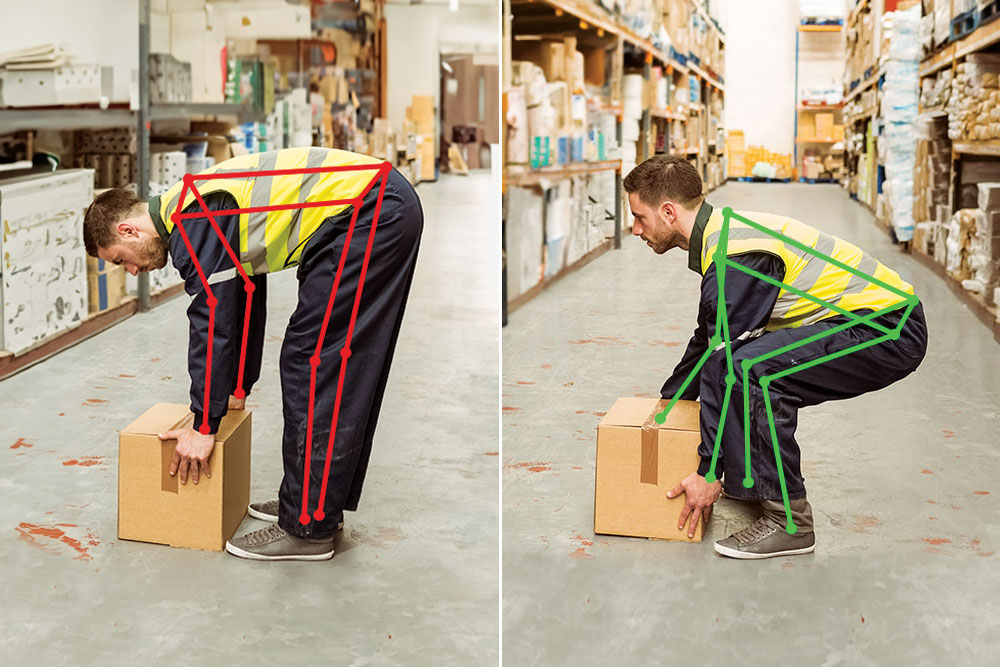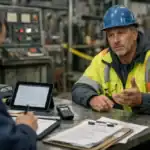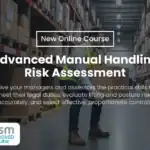Manual handling training is essential for workplace safety, but traditional training methods often fail to deliver the desired results. However, a revolution is underway, driven by a union of long-standing scientific research and new learning technologies.
This blog will explore the science behind manual handling training, the challenges of traditional methods and how innovative tools like the MMH Ergo Analyser are transforming the landscape.
The foundation of effective manual handling training lies in understanding what the science tells us. According to research from the Health and Safety Executive (HSE), traditional techniques, such as skills-based and educational training, have shown little to no impact on reducing injury rates or back pain in both industrial and healthcare settings. The primary reason for this ineffectiveness is the gap between what is taught in the classroom and what is implemented in the workplace.
To be competent in any task, individuals need three elements: knowledge (the know-how), skill (the do-how) and experience. Research shows that simply imparting knowledge in a classroom setting does not translate into practical skills in the workplace. Effective training must involve hands-on practice to bridge this gap.
Another critical aspect of learning science is the forgetting curve, which illustrates how quickly information is lost if not reinforced. Studies indicate that people forget up to 50% of new information within 24 hours and up to 90% within a week. This phenomenon highlights the need for ongoing reinforcement and practice. Traditional manual handling training sessions, typically conducted infrequently, fail to provide this necessary reinforcement, leading to poor retention and application of skills.
Research highlights that training must be frequent and tailored to the specific tasks and risks of a particular workplace. The HSE report emphasises that training sessions should not be isolated events but integrated into employees’ day-to-day routines to ensure effective skill transfer and retention.
Traditional manual handling training faces several significant challenges:
- Lack of Practical Application: Classroom-based training often does not translate into practical skills. Trainees may understand the theory but fail to apply it correctly in real-world situations. The discrepancy between knowledge and application leads to ineffective training outcomes.
- Infrequent Training: Training sessions are often too infrequent, leading to high levels of forgetting. With long gaps between training sessions, the skills and knowledge imparted quickly degrade, resulting in a need for retraining and an increased risk of injuries.
- Lack of Feedback: Traditional training methods often do not provide feedback on performance. Without understanding what they are doing wrong, trainees cannot correct their techniques, making it difficult to improve their skills.
- One-Size-Fits-All Approach: Generic training content fails to address the specific needs and risks of different workplaces. Every workplace has unique challenges and risks associated with manual handling, and training must be tailored to reflect these specifics to be effective.
- Poor Management Support: Successful implementation of manual handling training requires strong management support. Without management commitment to integrating training into daily operations and encouraging a culture of safety, training programmes often fail to achieve their goals.
- No Reinforcement Mechanism: Effective training requires ongoing reinforcement. Traditional training programmes often lack mechanisms for continuous learning and practice, leading to a decline in skill retention over time.
One of the most innovative tools in modern manual handling training is the MMH Ergo Analyser, developed by Human Focus. This video-based app uses artificial intelligence to provide detailed feedback on manual handling techniques, addressing many of the challenges identified in traditional training methods.
The MMH Ergo Analyser allows trainers to capture video clips of employees performing manual handling tasks. These clips are then analysed to create a three-dimensional musculoskeletal model, highlighting proper and improper techniques. The app provides a score at the end of each session, giving trainees actionable feedback on their performance.
The MMH Ergo Analyser is a highly innovative video-based app that uses artificial intelligence to help provide feedback to trainees as they perform manual handling tasks in the workplace. Trainees can see a 3D musculoskeletal model overlaid on their movements, highlighting good and bad practices, and providing a performance score.
Lack of Practical Application: The MMH Ergo Analyser ensures hands-on practice by capturing real-world manual handling tasks. By reviewing their movements through video feedback, trainees can understand and correct their techniques, bridging the gap between theory and practice.
Infrequent Training: The tool can be used regularly, integrating training into everyday tasks. This ongoing use helps reinforce skills and combat the forgetting curve, ensuring that knowledge and techniques are retained over time.
Lack of Feedback: The MMH Ergo Analyser provides detailed, actionable feedback after each session. This allows trainees to understand their mistakes and improve their techniques, addressing the challenge of feedback deficiency in traditional training.
One-Size-Fits-All Approach: The app allows for the creation of customised training content tailored to specific manual handling tasks. This ensures that the training is relevant and addresses each workplace’s unique challenges and risks.
Poor Management Support: By providing quantifiable data on improvements and risk reductions, the MMH Ergo Analyser can help demonstrate the value of manual handling training to management. This data can be used to gain stronger management support and integrate safety into the organisation’s culture.
No Reinforcement Mechanism: The MMH Ergo Analyser facilitates continuous improvement by allowing organisations to track progress over time. Regular use of the tool helps maintain high levels of skill and safety awareness, ensuring that training is not a one-time event but an ongoing process.
The revolution in manual handling training is here, driven by a blend of scientific insights and cutting-edge technology. By moving beyond traditional methods and embracing modern tools like the MMH Ergo Analyser, organisations can significantly enhance the effectiveness of their manual handling training programmes. This approach improves safety, reduces injuries and fosters a culture of continuous learning and improvement.
For organisations looking to revolutionise their manual handling training, the combination of ongoing, practical training with detailed feedback and tailored content is the key to success. Embrace the future of manual handling training today and ensure a safer, more efficient workplace.
























